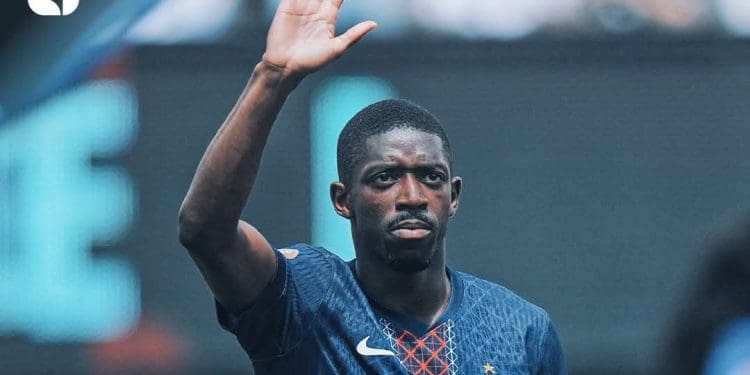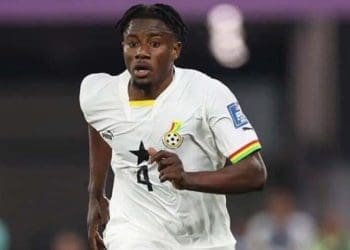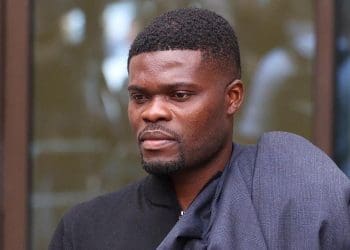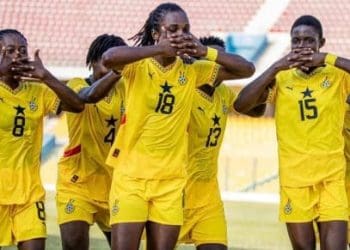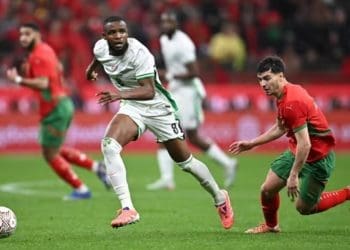Although Paris Saint-Germain is home to a host of stars, each of which shines brightly in the French capital, one has arguably outshone the rest. His name is superstar Ousmane Dembélé.
With a captivating campaign under his belt, the French forward is now readying himself to take on Chelsea FC in the FIFA Club World Cup 2025™ final on Sunday.
Victory would represent another incredible milestone for the 28-year-old, whose journey began in the modest, provincial town of Evreux, situated around an hour away from Paris.
There, in a quiet corner of Normandy, the newly crowned European champion found what would one day capture his heart – football.
Romaric Bultel, one of his coaches at the local club, Evreux FC 27, remembers a boy who was “talkative, open-hearted and genuinely funny, even back then”.
“Ousmane was just a kid when I first met him, but he already got along with and talked to everyone, no matter their age,” Bultel told FIFA. “He was frequently hanging around the stadium and he had a real passion for the game – he always had a ball at his feet. The ball was his friend. It never left his side, much like how everyone is glued to their phones these days. He was like a child with their comfort blanket.”
The young Dembele excelled under the Norman coach’s guidance at U-14 level, even playing above his age group against players who were two years his senior.

From the start, his technical brilliance set him apart – a natural gift, as those who worked alongside him in Evreux were quick to point out, that was all his own.
“He had innate technical skill,” continued Bultel. “Even before I worked with him, I saw him pull off things I’ll remember for the rest of my life. It was as if he had hands for feet. He was slight and small, lacked muscle and didn’t have much pace. But, in terms of technique… that was the first and only time I’ve seen such a gifted and technically capable kid. It’s unbelievable how naturally it came to him.”
Dembele’s talent eventually outgrew Evreux FC 27 and, although clubs such as Le Havre and Caen were vying to sign him, the 13-year-old opted to continue learning his trade at Rennes, also an early stomping ground for the likes of Eduardo Camavinga, Raphinha and Desire Doue.
The young prodigy thrived and soon caught the attention of the first‑team coach at that time, Philippe Montanier.
“The director of the centre and I kept a close eye on the reserve team and on our top prospects,” the 60-year-old coach told FIFA. “Whenever we had youngsters with huge potential, we gave them some exposure to first-team training. That was the case with Ousmane; he was already firmly on our radar. He was definitely the standout sensation of his generation.”
What made Montanier’s bond with the young forward even more special were their shared roots; both were Normandy natives born in the picturesque town of Vernon in northern France who first kicked a ball in the Madeleine neighbourhood of Evreux.
“There was naturally a bit of a connection there, so he was a youngster I followed with interest,” noted Montanier.
“What was truly striking was how effortlessly he could go past opponents, as well as his ability to play with both feet. I remember watching him play for the reserves – he took a corner with his right foot, then immediately followed it with one from his left. His two-footedness was remarkable. He’s someone who had a great work rate and he moved quickly, both on and off the ball. He was quite skinny, but he more than held his own in physical battles.”
Montanier, who is currently on the lookout for a new challenge, has marvelled at his former player’s performances at the Club World Cup.
He can only applaud how far his former protege has come since 6 November 2015, when he threw him in at the deep end in professional football in a 2-2 draw against Angers.

At just 18 years old, Dembele only had to wait until his second appearance, in another 2-2 draw (this time against Bordeaux) a fortnight later, to open his professional goalscoring account.
“I did my best to help him feel at home,” recalled the ex-Rennes boss. “Two or three young players had taken him under their wing because he’s a likeable guy. But he’s also got a big personality. He wasn’t afraid to speak up. I remember one particular match against Lorient when, at half-time, we were really up against it. He basically turned everything on its head.”
One moment that left a lasting impression on Montanier came when Dembele – still at a tender age – insisted on taking a penalty.
“As with many elite players, even at a young age, he displayed a strong personality, although it was fully grounded in a sense of team spirit. He had character, but in a positive way: he knew how to stand up and fight, how to galvanise others, and how to provide a spark of inspiration.”
By 2015, Montanier had already shown a knack for unearthing future world champions.
Before taking charge at Rennes in 2013, the French coach had managed Real Sociedad, where he helped none other than Antoine Griezmann to break through at elite level.
And just a few weeks before both players claimed glory in Russia in 2018, one moment in particular struck a chord with the coach.
“I was at the [French Football] Association at that time, so I went to the pre-tournament camp at the Clairefontaine training centre. They both came to see me – they were adorable, great lads with a good attitude. It’s a pleasure to have coached players like them.”
Given Dembele’s rare talent and impressive mentality, did those who coached him before his move to Borussia Dortmund, then Barcelona, and before he began to dazzle with PSG ever doubt that he was bound for global greatness?
“We struck gold when we found Ousmane,” explained Bultel. “Everyone wanted him in their squad. We thought he was something special when he was with us, but we stopped short of calling him a future star, mostly because we’d never seen anyone like him before. On the other hand, we didn’t want to hold him back.”
Actually, the player didn’t see himself as a rising star who would one day win all these trophies either. “I didn’t know if I was that talented, but I’ve been doing what I love since the beginning,” Dembele said in an exclusive interview with FIFA during the 2025 Club World Cup. “I enjoy it. I try to be a competitor, someone who wants to win trophies and achieve their dreams. So far, I’ve done that, and I hope it continues.”

“When a player is 18 years old, it’s hard to say that he’s going to be one of the best in the world,” said Montanier.
“It was the same with Antoine [Griezmann]. They have clear potential, but they have to navigate every stage of their development. We’ve seen immensely promising players fail to see it through, burn out or fall short. It’s tough to predict.”
Following his exploits in Evreux and Rennes, Dembele’s next chapter was built on his talent, hard work and tenacity. The 2018 FIFA World Cup™ winner has since experienced highs and lows, but everyone who coached him along the way can only tip their hats – they had a future star on their hands who now stands on the brink of another world title this Sunday, this time at club level.
“Those of us who witnessed his first steps would undoubtedly be delighted [for him to win] – not just for his sake, but also for France and for all the smaller clubs out there,” concluded Montanier.
“It’s a reminder that it all began in La Madeleine in Evreux, with the coaches who gave him that passion for football and the desire to invest in himself and to keep improving.”
Should Dembele hoist the trophy high into the New York New Jersey sky on Sunday, a glimmer of that stardust may well drift all the way back home to northern France – the launchpad for his meteoric rise.
fifa.com

